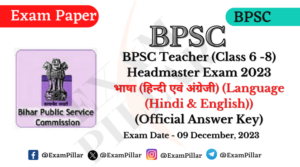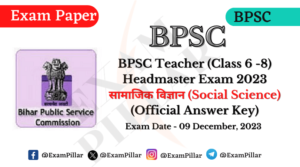बिहार लोक सेवा आयोग (BPSC – Bihar Public Service Commission) के द्वारा आयोजित की गई बिहार शिक्षा भर्ती का आयोजन 26 अगस्त 2023 को प्रथम पाली में किया गया था। इस परीक्षा के परीक्षा के भाग II – अंग्रेजी का प्रश्नपत्र उत्तर कुंजी सहित (Exam Paper With Answer Key) यहाँ उपलब्ध है –
Bihar Public Service Commission (BPSC) has Conduct the BPSC TER (Teachers Recruitment Exam) Exam 2023 held on 26 August, 2023 (First Shift). This BPSC Teacher Question Paper 3 (Part II English) available here with Answer Key.
| परीक्षा | BPSC TRE Exam 2023 (Class 9 to 10) |
| विषय | Paper – 3 Part – II अंग्रेजी (English) |
| परीक्षा तिथि |
26 अगस्त, 2023 (Ist Shift) |
| कुल प्रश्न | 120 (40 + 80) |
| पेपर सेट | A |
BPSC School Teacher Written (Objective) Competitive Examination 2023
(Class 9 – 10) (Official Answer Key)
PART — II (English)
Directions (Q. Nos. 41 to 65): Read the passage given below and answer the questions that follow.
It is a cold night in December and in a remote village, an old storyteller is sitting by the hearth-fire with a group of students who have come home for the winter holidays. They love visiting her to listen to her stories, but tonight Granny is not her usual chirpy self; she looks much older and seems to be agitated over something. One of the boys asks her whether she is not feeling well and tells her that if so, they can come back another night. But instead of answering the question, the old woman starts talking and tells them that on a certain night a peculiar wind blows through the village, which seems to start from the region of the graveyard and which sounds like a hymn. She also tells them that tonight is that kind of a night. At first the youngsters are skeptical and tell her that they cannot hear anything and that such things are not possible, but the old woman rebukes them by saying that they are not paying attention to what is happening around them. She tells them that youngsters of today have forgotten how to listen to the voice of the earth and the wind. They feel chastised and make a show of straining their ears to listen more attentively and to their utter surprise, they hear the beginning of a low hum in the distance. They listen for some time and tell her, almost in triumph, that they can hear only an eerie sound. ‘No’, the storyteller almost shouts, ‘Listen carefully. Tonight is the anniversary of that dreadful Sunday.’ There is a death-like silence in the room and some of them begin to look uneasy because they too had heard vague rumours of army atrocities that took place in the village on a Sunday long before they were born. Storyteller and audience strain to listen more attentively and suddenly a strange thing happens as the wind whirls past the house, it increases in volume and for the briefest of moments, seems to hover above the house. Then it resumes its whirling as though hurrying away to other regions beyond human habitation. The young people are stunned because they hear the new element in the volume and a certain uncanny lilt lingers on in the wake of its departure. The old woman jumps up from her seat and looking at each one in turn asks, You heard it, didn’t you? Didn’t I tell you? It was Apenyo’s last song’ and she hums a tune softly, almost to herself. The youngsters cannot deny that they heard the note but are puzzled because they do not know what she is talking about. As the old woman stands apart humming the tune, they look at her with wonder. There is a peculiar glow on her face and she seems to have changed into a new self, more alive and animated than earlier. After a while a young girl timidly approaches her and asks, ‘Grandmother, what are you talking about? Whose last song?’
The old storyteller whips around and surveys the group as though seeing them for the first time. She then heaves a deep sigh and with infinite sadness in her voice, spreads her arms wide and whispers, ‘You have not heard about that song? You do not know about Apenyo? Then come and listen carefully …’
Thus, on a cold December night in a remote village, an old storyteller gathers the young of the land around the leaping flames of a hearth and squats on the bare earth among them to pass on the story of that Black Sunday when a young and beautiful singer sang her last song even as one more Naga village began weeping for her ravaged and ruined children.
[An extract from ‘The Last Song’ in These Hills Called Home, by Temsula Ao, Penguin Books, New Delhi : 2006, p.31 – 33]
41. Why was the grandmother listless that night?
(A) She was unwell
(B) She was too old
(C) She was anxious
(D) More than one of the above
(E) None of the above
Show Answer/Hide
42. How best can one describe the character of the storyteller?
(A) Garrulous and cantankerous old woman
(B) Cheerful and lively old lady
(C) Indolent lady and grumpy old
(D) More than one of the above
(E) None of the above
Show Answer/Hide
43. What does the term ‘hearth-fire’ indicate?
(A) Fireplace
(B) Stove
(C) Grate
(D) More than one of the above
(E) None of the above
Show Answer/Hide
44. What was so special about ‘that night’?
(A) It was a stormy night with incessant thunder and rain
(B) It was that fateful night when a peculiar wind blew
(C) It was a silent night when the moon had a lurid glow
(D) More than one of the above
(E) None of the above
Show Answer/Hide
45. What is the trajectory that the song takes in the story?
(A) The song arises from the graveyard filling the whole village and disappears beyond human habitation
(B) The song arises from the graveyard filling the whole village with good cheer and dissipates into nothingness
(C) The song arises from the graveyard filling the whole village with sadness and fades away gradually
(D) More than one of the above
(E) None of the above
Show Answer/Hide
46. Why do listeners gather to hear stories at night in remote villages upon the hills of North-East India?
(A) They are engaged in factories and offices during the day
(B) They are engaged in their farms, collection of firewood and water, and other mundane affairs
(C) They are engaged in the textile and mining industry
(D) More than one of the above
(E) None of the above
Show Answer/Hide
47. Pick out a synonym for the word ‘rebuke’ from the extract.
(A) Chastised
(B) Agitated
(C) Ravaged
(D) More than one of the above
(E) None of the above
Show Answer/Hide
48. Which word in the story indicates supernatural elements?
(A) Eerie
(B) Uncanny
(C) Uneasy
(D) More than one of the above
(E) None of the above
Show Answer/Hide
49. Describe the look on the storyteller’s face when they all clearly hear the tune of the song.
(A) Stunned
(B) Alive and animated
(C) Puzzled
(D) More than one of the above
(E) None of the above
Show Answer/Hide
50. How would you describe the listeners?
(A) As casual and irresponsible
(B) As carefree and lighthearted
(C) As polite and considerate
(D) More than one of the above
(E) None of the above
Show Answer/Hide
51. What is the role of the storyteller in Naga society?
(A) A bearer of traditional lore
(B) A bearer of history
(C) A bearer of truth
(D) More than one of the above
(E) None of the above
Show Answer/Hide
52. Which colloquial word is an equivalent of the term ‘grandmother’ that has been used in the extract?
(A) Grandma
(B) Granny
(C) Matriarch
(D) More than one of the above
(E) None of the above
Show Answer/Hide
53. Why does the storyteller feel that the ‘youngsters of today have forgotten how to listen to the voice of the earth and the wind’?
(A) As they are skeptical
(B) As they are inattentive
(C) As they are disbelievers
(D) More than one of the above
(E) None of the above
Show Answer/Hide
54. What is the initial note of the song compared to in the extract of the story?
(A) A hymn
(B) Blowing of a peculiar wind
(C) A low hum
(D) More than one of the above
(E) None of the above
Show Answer/Hide
55. Pick up an equivalent of the word ‘cadence’ or ‘rhythm’ from the extract of the story.
(A) Hum
(B) Lilt
(C) Tune
(D) More than one of the above
(E) None of the above
Show Answer/Hide
56. Which phrase in the extract of the story describes the feeling of surprise or astonishment with reference to the storyteller?
(A) Peculiar glow on her face
(B) More alive and animated
(C) As though seeing them for the first time
(D) More than one of the above
(E) None of the above
Show Answer/Hide
57. The narrator seemed out of joint because
(A) she was unwell
(B) she was listless
(C) she was trapped in dark thoughts
(D) More than one of the above
(E) None of the above
Show Answer/Hide
58. Which phrase in the extract is a close equivalent of ‘pin-drop silence’?
(A) Death-like silence
(B) Haunted silence
(C) Icy silence
(D) More than one of the above
(E) None of the above
Show Answer/Hide
59. What made the listeners ‘skeptical’?
(A) They were educated
(B) They were rational
(C) They could hear nothing
(D) More than one of the above
(E) None of the above
Show Answer/Hide
60. Which elemental feeling is most prominent in the story?
(A) Tragic
(B) Elegiac
(C) Ghostly
(D) More than one of the above
(E) None of the above
Show Answer/Hide




